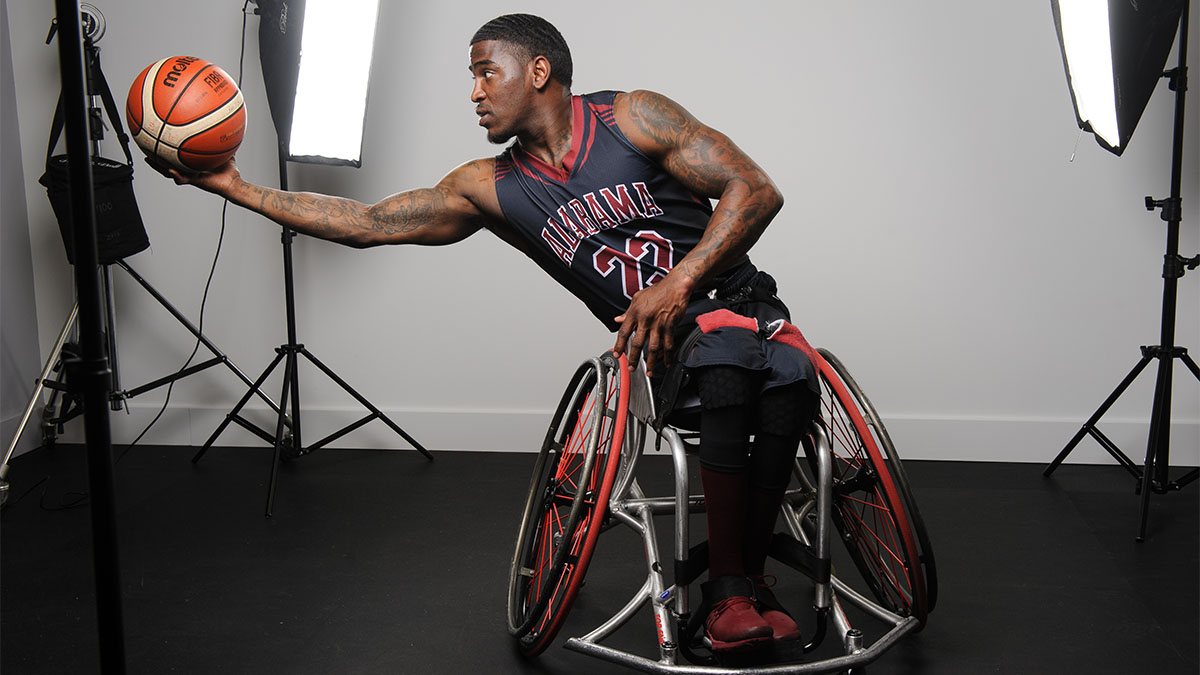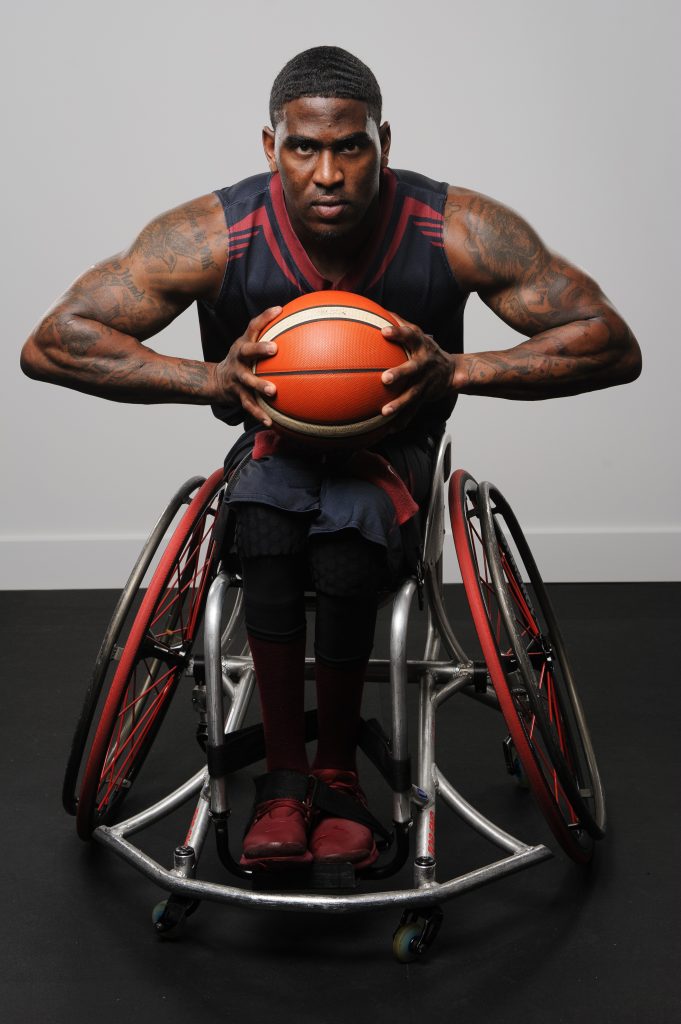After a shooting left him paralyzed, DeQuel Robinson finding new life in wheelchair basketball

Lapsing in and out of consciousness after seven bullets riddled his body, DeQuel Robinson somehow reached for his cell phone and dialed 911.
Ninety minutes after a gunman opened fire in a parking lot behind a Mobile, Ala., nightclub, Robinson was in an ambulance and on his way to a hospital. His life-altering journey had begun.
A few days after that October 2008 shooting, Robinson received a prognosis that would sink many a soul, but one that set him on a course that has allowed him to rise far above the horrors of that evening.
Exercising good judgement was not always a priority for Robinson. After graduating from LeFlore High School in Mobile, he had a scholarship to play football at Alabama A&M. But his time at the Huntsville campus was limited to one semester thanks to an on-campus altercation.
With his scholarship pulled, he left A&M and became a member of the track team at Southwest Mississippi Community College. While he spent a season running hurdles, the death of his great-grandmother, with whom Robinson was close, set him back. He left SMCC to return to Mobile.
“I was young at that time and dealing with a lot of pain because of the passing of my great-grandmother,” he said. “So much was going through my mind and I didn’t know what direction I wanted to take. I ended up leaving.”
[beauty_quote quote=' “I pretty much got sucked into things I shouldn’t have. I was with friends; we would run into people I knew from the past and altercations would happen. I would just get sucked up into everything.” -DeQuel Robinson ']
Back in Mobile, Robinson thought, perhaps, he could explore professional track and field opportunities. But everything was put on hold that autumn evening a decade ago, a shooting that was the result of another altercation.
“I pretty much got sucked into things I shouldn’t have,” he said of the incidents at A&M and in Mobile. “I was with friends; we would run into people I knew from the past and altercations would happen. I would just get sucked up into everything.”
The then 21-year-old Robinson needed plenty of motivation throughout the ensuing days, months and years. The bullet that did the most damage grazed his spinal column, leaving him unable to walk. The other bullets, fortunately, did not result in additional internal damage. In fact, when he was discharged, three of them remained in his back, hip and wrist. They were later removed.
“I didn’t look at it as being something bad, but something that I could probably grow from and maybe, potentially, be able to walk again,” he said. “I have always been a determined guy. I always motivated myself.”
After two weeks of what was nearly a month-long hospital stay, Robinson felt a twitch in his right leg. He eventually was able to acquire the ability to at least move his legs.
“I am at the point right now where I can move my legs some and walk with a walker,” he said of his decade-long progression. “I am gradually trying to make progress and get better each and every day.”
A multisport star at LeFlore, Robinson wanted to stay involved athletically. With his condition, though, he was not sure if that was possible until one of his physicians connected him to a member of the Mobile Patriots, a wheelchair basketball team.
Robinson, who is now 30, found the sport to his liking and began playing for the Patriots in 2010. That led him to becoming a scholarship wheelchair basketball player at the University of Alabama.
“A couple of my teammates in Mobile played wheelchair basketball at Alabama,” said Robinson, who arrived in Tuscaloosa in 2013 after freshening up his academics at Bishop State Community College in Mobile. “They told me that if I keep it up and keep getting better there is a possibility that I may get a scholarship to the University of Alabama to play wheelchair basketball. At that time, I didn’t know there was a wheelchair basketball team at the University of Alabama.”
A call from then-Crimson Tide wheelchair coach Miles Thompson resulted in a campus visit.
“He asked if I would come for a visit,” said Robinson. “That’s how it all started.”
[beauty_quote quote=' “I am at the point right now where I can move my legs some and walk with a walker. I am gradually trying to make progress and get better each and every day.” -DeQuel Robinson ']
Today, Robinson is pursuing a master’s in sports management while serving as a captain on the men’s wheelchair basketball program. Injuries slowed him his first couple of seasons with the team – wheelchair basketball players have five years of eligibility – but not in class, where his diligence resulted in an undergraduate degree in kinesiology last spring.
“It’s a blessing to be where I am right now,” he said.
Not getting sucked into potentially tense situations is something Robinson preaches today. He has spoken to a number of youth groups about how they should learn to avoid potential conflict, instead of learning the hard way.

“That’s one of the main topics I speak about,” he said. “The choices and decisions we make no matter how old we are or where we are in life have a major impact on what can happen to us.
Robinson, who would like to work with a professional sports team in a fitness and wellness capacity, has had a positive impact at Alabama. Brent Hardin and his wife, Margaret Stran, founded Alabama’s adaptive athletics program in 2003. He said he has received a great deal of feedback regarding Robinson.
“He has real positive energy and is a wonderful human being,” said Hardin, who is the program’s director. “He can find the good in most any situation. I can think of many times where his professors and other people on campus who have interacted with him have said things to me about what a great guy he is, how much they enjoyed having him in their class and things of that nature.”
Men’s wheelchair basketball coach Ford Burttram, an adaptive athlete himself, has equally glowing things to say.
“He is really a loving, happy-go-lucky and charismatic young man,” he said. “He does a ton of things off the court to help underprivileged youth. It’s been impressive to watch him develop over the past five years.”
In addition to preaching to youth about taking the high road when life situations get tense, Robinson also tells them that should they suffer a setback, whatever it might be, to stay strong and realize there is light at the end of a seemingly endless tunnel. It is a message that could apply to anybody, not just youth.
“You possess the power and you have the will to overcome any and every situation,” he said. “You have to put your mind toward wanting to do so.”
DeQuel Robinson did just that.
Tom Layberger has spent more than 25 years as a writer, editor and web producer for various media outlets. Tom, who resides in Tampa, is a graduate of the University of South Florida. Follow him on Twitter @TomLay810
Related Articles
Alabama's Stran-Hardin Arena brings adaptive sport vision to life

